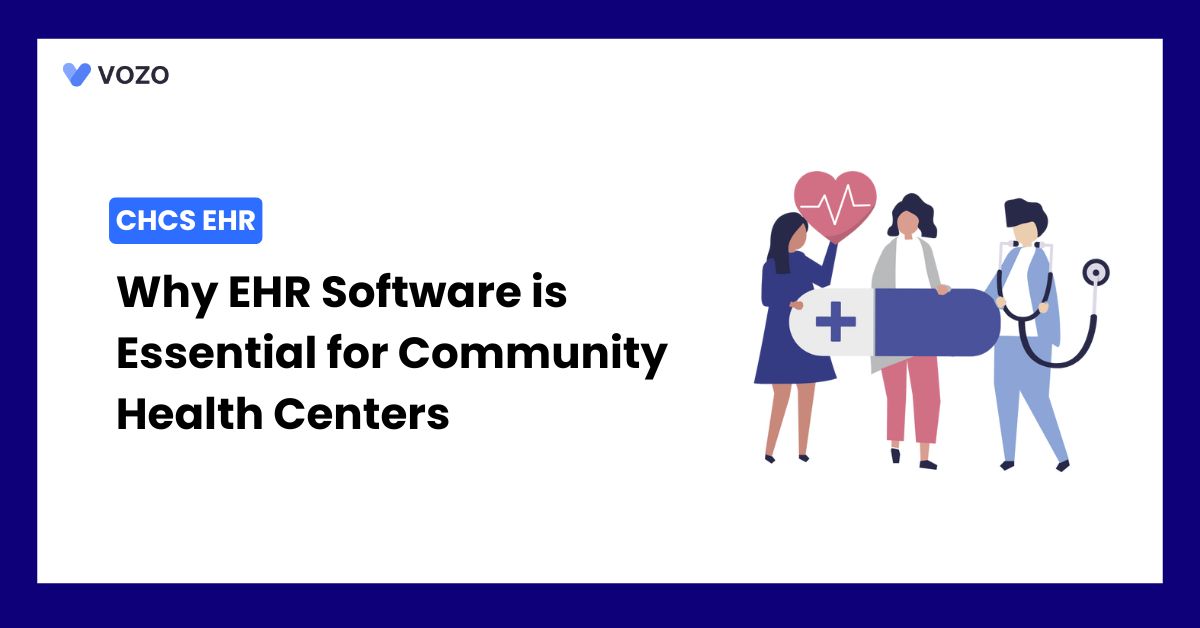Why EHR Software is Essential for Community Health Centers
Community health centers serve more than 31 million people annually across the United States. These centers have expanded significantly over recent years, with nearly 2.7 million more patients served since 2020.
As the CHCs continue to bridge healthcare access gaps, the need for efficient care delivery becomes paramount. This is where EHR comes in.
For every $1 spent on clinical care, an estimated $0.24 is spent on administration. This disproportionate spending affects CHCs’ budgets and their ability to allocate resources toward improving patient care.
Utilizing EHR software can help community health centers streamline the administration and other related works to focus on improving the quality of care. In this blog post, you’ll learn why EHR software is essential for community health centers.
6 Reasons Why EHR Software is Essential for Community Health Centers
According to the National Association of Community Health Centers, community health centers are dedicated to making it easier to offer care to all individuals, regardless of their ability to pay.
CHC plays a vital role in supporting underserved communities and improving access to essential healthcare services by overcoming challenges like cost, insurance gaps, geographic barriers, and language differences.
A reliable community health center EHR can help you continue this mission effectively. Here is why EHR is important for community health centers:
Related: Top 3 EHR Challenges in Community Behavioral Health and How to Overcome Them
1. Fosters a Personalized Approach to Patient Care
- Electronic health records hold the complete health information of individual patients.
- For instance, demographics, contact information, health vitals, medications, progress notes, laboratory data, treatment plans, medical history, insurance details, and others.
- By having a complete pack of health information about the patient, Community Health Centers can tailor the treatment plans to deliver a personalized approach to patient care.
- This is specifically to address diverse population needs and conditions.
2. Enhances Health Data Collection and Reporting Accuracy
- With EHR software, CHCs can collect comprehensive patient health data to track their trends and outcomes among the patient population.
- It has advanced data collection and reporting tools that help community health centers to make data-driven decisions.
- These tools often enable community healthcare providers to streamline the documentation process, reducing manual tasks and minimizing errors.
- Using reporting capabilities, community health centers can monitor key performance indicators, such as patient satisfaction, treatment effectiveness, and resource utilization.
Related: The Role of EHRs in Value-Based Care and Population Health Management
3. Empower patients Through Engagement and Education
- Integration between community health EHR and patient portal platforms can enhance the potential for the delivery of convenient care for patients.
- Using patient portals can enable access to patients to access their health records anytime, schedule appointments, request eRx, and communicate with their providers.
- Moreover, patient portals have educational resources related to specific health conditions of patients.
- This will help them to be well-educated about their health conditions and modify their lifestyle.
- However, EHR integration with patient portals can enable them to stay active in their healthcare.
4. Reduces the Risk of Fragmented Care
- EHR systems have all the patient data in one place which is easily accessible for all providers who are involved in patient care.
- This way, all the providers have access to the same updated patient information which is important for continuity of care.
- Different healthcare providers with shared access to information on patient histories, diagnoses, and treatments can lead to better coordination among them.
5. Optimizes and Simplifies Administrative Tasks
- Administration tasks and other related operations can limit community health centers to focus on patient care.
- EHR software has various features, such as appointment scheduling, billing, and referrals, that help optimize and simplify administrative tasks.
- For instance, appointment scheduling helps to streamline the patient scheduling process which ultimately reduces patient wait times.
- Other features like billing, e-prescriptions, referrals, and patient record management can assist and speed up the operation so that community health centers can be involved in patient care.
Vozo Cloud EHR for your Practice
From managing and organizing patient health records digitally to reducing medical errors, it significantly empowers providers to improve healthcare quality.
If you are searching for the best EHR system for your healthcare practice, Vozo EHR can be your go-to choice. Our comprehensive EHR solution lets you focus more on patient care while carrying all the burdens and simplifying it.
- Vozo Cloud EHR’s cost-effective cloud subscription benefits all levels of practice.
- Our feature-rich EHR helps you rectify mistakes efficiently and speed up the process.
- Vozo Specialty EHR resonates with specialty practice needs and requirements.
- Our expert technical team got you covered 24/7 if any needs arise.
- Our EHR System continues to scale as your healthcare practice grows to improve the user experience.
The Vozo Customized EHR solution benefits your healthcare practice by
- Streamlining the administrative process
- Improving workflow efficiency
- Reducing proneness to errors
- Manages all the patient’s records in one place
- Offers greater efficiency and cost-savings across the board.
Our specialty-specific tools like scheduling, patient portals, lab integration, cloud hosting, and more meet the specific needs and requirements of your healthcare practice.
“Embrace Vozo EHR to Reduce Your Burdens and Enhance Patient Care”
About the author

With more than 4 years of experience in the dynamic healthcare technology landscape, Sid specializes in crafting compelling content on topics including EHR/EMR, patient portals, healthcare automation, remote patient monitoring, and health information exchange. His expertise lies in translating cutting-edge innovations and intricate topics into engaging narratives that resonate with diverse audiences.













